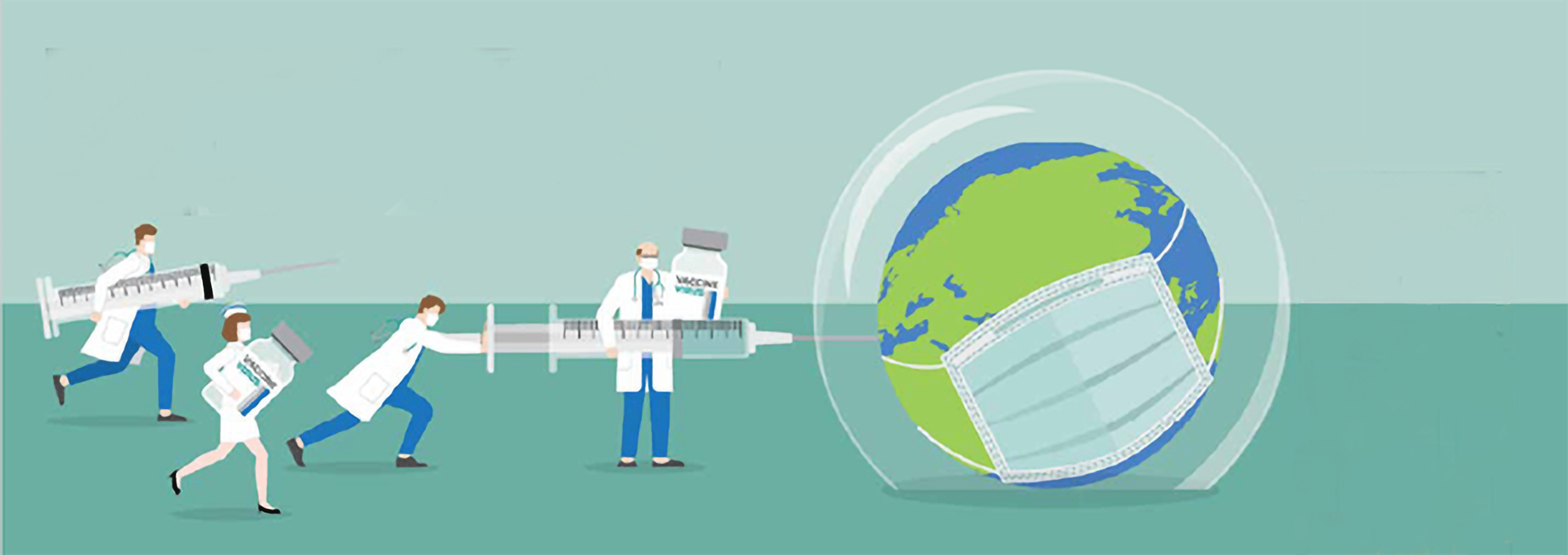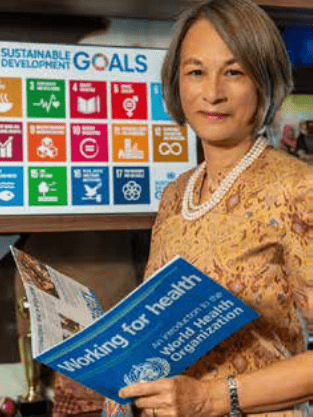Stories > The Merits of Multilateralism
The Merits of Multilateralism
The global fight against Covid-19 has brought nations together with one shared objective – vaccinating their populations.
BY RAHIMAH RASHITH
ILLUSTRATIONS ISTOCK

In response to the ongoing pandemic, the WHO and other international health organisations have banded together to provide countries – both developed and developing – equal access to Covid-19 vaccines.
he latest figures – 168 million cases and a death toll of 3.5 million – from the ongoing Covid-19 pandemic are astounding, the World Health Organization (WHO) reports. With the pandemic showing no signs of abating, hope hinges on one possible solution that can save lives and livelihoods: the availability of vaccines.
But as the First World has taken strides in inoculating their populations against the SARS Cov-2 virus, developing countries have fallen behind. A study by the Economist Intelligence Unit estimates that wealthier nations like the US, the UK and most countries in the European Union would have achieved “widespread vaccination coverage” by the end of 2021, while 84 of the world’s least developed states will not have enough vaccines to achieve herd immunity until 2024.
Anticipating this disparity, the WHO, European Commission and France launched the Access to Covid-19 Tools (ACT) Accelerator initiative in response to the pandemic back in April 2020. Comprising three key pillars – Covid-19 diagnostics, treatments and vaccines – the effort brought together governments, global health organisations, manufacturers, scientists, the private sector, civil society and philanthropic organisations in one of the world’s largest health campaigns in the history of mankind.
“WE ARE GRATEFUL FOR SINGAPORE’S SUPPORT TO COVAX, WHICH HAS HELPED US WORK TOWARDS ENSURING THAT EVERY ECONOMY, PARTICULARLY THOSE WITH THE LEAST RESOURCES, DON’T GET LEFT BEHIND IN THE RACE FOR A COVID-19 VACCINE,” SAYS MARIE-ANGE SARAKA-YAO, MANAGING DIRECTOR, GAVI.
Covid-19 Vaccines Global Access (COVAX) is a global platform centred specifically on the vaccines aspect. It enables countries to pool risk and resources to gain access to a portfolio of vaccines from different vaccine developers. More importantly, it aims to provide Covid-19 shots to at least 20 per cent of the population in the world’s poorest nations at no cost. This initiative is key to addressing vaccine nationalism, as resourceful countries rush to secure vaccines by forging bilateral deals ahead of less developed ones.
To create a more accessible framework across nations, Singapore founded the informal Friends of COVAX Facility, a multinational group. With Switzerland joining the initiative as co-chair, the two countries have been working with Gavi, a public-private vaccine alliance partnership; the Coalition for Epidemic Preparedness Innovations, a foundation that finances independent research projects to develop vaccines against emerging infectious diseases; and WHO to iron out the details of the programme (see below).
THE BIGGER PICTURE
More than two-thirds of the world is engaged in COVAX today, and Singapore has been recognised for its contribution towards kick-starting the global initiative. “In a pandemic, no country is an island, and we are all impacted by the decisions of others,” says Dr Jacqueline Lo Ying-Ru, WHO Representative in Malaysia, Brunei Darussalam and Singapore. “In circumstances such as these, it is important to work together to find solutions. Such active support and multilateral cooperation is key to our battle against the virus, and shows that it is not the size of the country that matters but the action it takes.”
Marie-Ange Saraka-Yao, managing director at Gavi, adds: “We are grateful for Singapore’s support to COVAX, which has helped us work towards ensuring that every economy, particularly those with the least resources, don’t get left behind in the race for a Covid-19 vaccine.” COVAX has thus far secured contracts for two billion doses of vaccines to be delivered to developing countries by the end of 2021.
SUPPLY AND DEMAND CHALLENGES
Despite the well-meaning efforts to ensure a fair global distribution of vaccines, Dr Lo explains that its execution remains complex and is further compounded by limited supply of vaccines. Furthermore, a slow release of funds that would enable developing countries to invest in vaccine transportation and storage infrastructure, as well as limited vaccine supplies, add to the challenges.

Professor Teo Yik Ying, dean of the Saw Swee Hock School of Public Health at NUS, advocates the sharing of Covid-19-related research data across countries to combat the crisis in tandem.
The lack of dedicated logistics and storage facilities has resulted in vaccines reaching their expiry date before they can be administered. On the other hand, surplus vaccines acquired by wealthier countries are not being used optimally either.
A significant hurdle that has been identified is the fact that COVAX continues to operate as a central co-ordinating agency for both funding and vaccine distribution with limited outreach capacity in remote parts of the world. Experts opine that the current system would benefit if it were decentralised so that local Non Governmental Organisations with a better grip on the ground situation could play a bigger and effective role. And in the latest turn of events, the more contagious Delta variant is threatening to unravel the progress made so far.
“Having a handful of advanced economies achieve a national roll-out of the vaccines at the expense of vaccine supplies for the rest of the world means that the virus continues to circulate and spread elsewhere, increasing the risk of emerging variants that are resistant to present vaccines,” notes Professor Teo Yik Ying, dean of the National University of Singapore’s (NUS) Saw Swee Hock School of Public Health.
“IN A PANDEMIC, NO COUNTRY IS AN ISLAND, AND WE ARE ALL IMPACTED BY THE DECISIONS OF OTHERS. IT IS IMPORTANT TO WORK TOGETHER TO FIND SOLUTIONS,” SAYS DR JACQUELINE LO YING-RU, WHO REPRESENTATIVE.

Dr Jacqueline Lo Ying-Ru of WHO highlights that limited supply and logistical challenges will further affect effective distribution of the vaccines.
COLLABORATION BEYOND VACCINES
However, vaccines are but one part of the equation. Equally important is access to a suite of other Covid-19 treatments and diagnostic tool kits on which Singapore and other member states are working together and can gain access to the ACT Accelerator, which coordinates the generation and use of knowledge around Covid-19.
“Scientists from across the world are collaborating and innovating to bring us not only vaccines but tests, treatments and therapeutics as rapidly as possible,” shares Dr Lo. As a validation of this cooperation, back in June 2020, Singapore, as the convener and chair of the Forum of Small States – an informal grouping of 108 countries each with a population of less than 10 million – was invited to the ACT Accelerator Facilitation Council.
Professor Teo of NUS highlights that Singapore has been contributing to, as well as utilising, the knowledge from the ACT Accelerator from the very beginning. For example, Singapore was one of the global clinical trial sites on different treatment protocols for Covid-19 patients. “This provides greater confidence to the scientific discoveries, given that the findings are robust across different country settings,” he adds. “It is through working together in a multilateral manner – where there is transparent and respectful sharing of data and resources – that the world is able to find solutions to a global problem such as Covid-19.”
THE GLOBAL FIGHT AGAINST THE COVID-19 PANDEMICAPRIL 2020 Launch of the Access to Covid-19 Tools Accelerator. COVAX is launched. It is co-led by the Coalition for Epidemic Preparedness Innovations, Gavi and WHO. AUGUST 2020 The European Commission announces its interest to join COVAX, along with an initial 400 million euro (US$487 million) commitment. SEPTEMBER 2020 Singapore announces the launch of Friends of COVAX Facility (FCF). It comprises 14 countries and the European Union. Switzerland joins as co-chair. DECEMBER2020 Singapore, as a self-financing participant of FCF, pledges US$5 million to the COVAX Advance Market Commitment (AMC) mechanism, which will help support access to Covid-19 vaccines for 92 low- and lower-middle-income countries. AMC eligible countries include several ASEAN nations as well as small states globally. APRIL 2021 Asia Philanthropy Circle, a nonprofit membership platform for Asian philanthropists with its headquarters in Singapore, pledges US$1.5 million. |
ON THE FRONTLINESIn addition to taking the lead on COVAX, Singapore has emerged as a hub for global collaborative efforts against the Covid-19 pandemic. SINGAPORE AIRLINES (SIA) Singapore’s national carrier has been instrumental in transporting and delivering Covid-19 vaccines in the region and around the world. The airline is a key member of the Changi Ready Taskforce – a collaboration involving government agencies, cargo handlers, airlines and freight forwarders – that has been set up to aid in the transportation and distribution of Covid-19 vaccines. SIA operates multiple weekly flights from key European pharmaceutical export hubs such as Amsterdam, Brussels and Frankfurt, and has an extensive network in Southeast Asia and the Southwest Pacific to facilitate transportation and delivery of the vaccine consignments. In December 2020, SIA delivered the first shipment of Pfizer- BioNTech vaccines to Singapore from Brussels, while in February 2021, it transported the first batch of vaccines to Australia and New Zealand, as well as Indonesia. SINGAPORE AIRPORT TERMINAL SERVICES (SATS) The Changi Airport groundhandling and catering services provider operates warehouses within the airport complex that can handle products in temperatures as low as minus-25 deg C. SATS has handled inbound and transshipment vaccine shipments for countries in the Asia-Pacific region. This includes the first batch of Covid-19 vaccines shipment meant for Australia and New Zealand while it was in transit in Singapore in February this year. Additionally, it has started laying the groundwork to increase its cool storage capabilities to handle high volumes of vaccines. NEW VACCINE PRODUCTION CENTRES Earlier this year, leading French pharmaceutical company Sanofi announced its decision to open a highly advanced production facility in Singapore to serve as a regional centre of excellence for vaccine production in Asia. The move, which complements its existing manufacturing capacities in Europe and North America, is expected to swiftly address future pandemic risks. Similarly, German company BioNTech, whose tie-up with Pfizer has produced one of the successful vaccines against Covid-19, has also announced Singapore as the site of its vaccine production centre for the Asia-Pacific region. |
